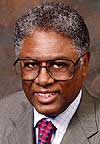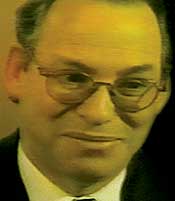Federal Dollars Wasted on “Diseases” that Don’t Exist
 It can also be called BRAINWASHING
“It can also be called brainwashing.” School texts, for
example, teach children that “sado-masochism may be very acceptable and
safe,” while portraying parental views of sex as “old-fashioned” or Sowell noted,
“Psychologists have been prominent among the proponents and creators of
these Coincidentally, with affective learning has come the rise of diagnoses of so-called “learning disorders” and a new growth industry in the U.S. Over a period of decades, America’s schools have become the number one source of referrals for the “mental health” industry. At the same time, this “mental hygiene” mindset has indoctrinated children into drugs as a “solution” to their problems. The effects have been catastrophic. (See “The Scandal of ‘Kiddie Coke,’”.) UNDERMINING PARENT-CHILD RELATIONSHIPS According to
Sowell, today’s “psychotherapeutic curriculum systematically undermines
the parent-child relationship and the shared values which make a
society He noted that schools engage in “anti-values” programs which attempt to alienate children from moral values. He said, “students are repeatedly told that it is they who individually must determine the values on which to make decisions — and the guidance repeatedly held out to them is the example of their peers.” He pointed out that some of these programs “warn against letting parents know the specifics of the material being used.” Values held by parents are denigrated. Children are taught that parents are “hung up” or have “serious problems” relating to such issues as sex. Children are taught that their parents might “go overboard” in handling these topics. Such is psychiatry’s influence on youth as it works to widen the generation gap and to forge “normal personalities,” devoid of morality. * It is also
known as “outcome-based education”.
References: |
Increasingly, decision makers are becoming concerned that funds from the National Institute of Mental Health (NIMH) and other bodies pour into psychiatric and pharmaceutical coffers, with no constructive results.
“The people at NIMH know very well that ADHD is not a disease,” said Baughman. Enormous sums of money are spent each year by the psychiatric industry and pharmaceutical companies on pseudo-scientific research to create the illusion that ADHD is a disease, he told Freedom. But, he warned, that doesn’t change the fact that no scientific evidence supports the claim.
Indeed, Baughman charges, a 1986 brain-scan study provided irrefutable evidence that those who have been on ADHD drugs sustained brain damage. The results of this and subsequent, similar studies have been twisted, said Baughman, by psychiatrists and drug makers to claim the damage occurred before drug use — with, once again, no evidence for the assertion.
Baughman has endeavored to get NIMH to conduct brain-scan studies that would track ADHD-diagnosed children from before they start on drugs, with a control group of ADHD-diagnosed children who are not drugged, but no such study has been done — an omission Baughman labeled “research malpractice” and “criminal.” NIMH, he charged, “purposely neglected to do the study that would have shown that ‘ADHD’ brains are no different than normal.”
Incestuous Financial Relations
A front group for psychiatric interests, Children and Adults with Attention-Deficit/Hyperactivity Disorder (CHADD), proclaims itself an “advocacy group” established to promote drugs as the “solution” to psychiatry’s ADHD diagnosis.
The group found itself under scrutiny in 2002 at a hearing of the Government Reform Committee, where Committee Chairman Dan Burton (R-IN) lambasted CHADD and its CEO, E. Clarke Ross, for the group’s ties with drug companies, noting that it had received $848,000 from one methylphenidate manufacturer alone.
“The appearance is that they’re feeding you to deal with this problem [of product advocacy],” Burton said, his voice rising. “And I would just suggest, if there is a better way to fund your organization ... it would be helpful. Because if you [were] in the United States Senate or the House and that happened, you would have a heck of a problem.”
CHADD’s 2000– 2001 annual report disclosed that the group received 19.6 percent of its budget from drug makers. Some suspect the actual percentage is even higher.
Freedom learned, moreover, that the $848,000 represented only the years 1991–1994 and 2002 — leaving the question of funding for 1995–2001 unanswered.
In testimony at the same hearing, the then acting director of the National Institute of Mental Health, Richard Nakamura, Ph.D., admitted “the exact etiology of ADHD is unknown”13 — a statement that may seem harmless, but which implies, with the weight of a federal official behind it, that a fictional disease actually exists.
It was acknowledged at the hearing that the Centers for Disease Control (CDC) had given $750,000 to CHADD, and that some $53 million had been spent by NIMH to “study” ADHD in 2001 — expenditures Baughman considers worse than dumping cash down a sewer. “It’s taxpayer money being used to deceive the public, and to victimize children and adults,” he said.
The CDC funds, awarded in August 2002, enabled CHADD to operate a “national clearinghouse,” a euphemism for more propaganda on behalf of the psychiatric and pharmaceutical industries.
Educator and author Beverly Eakman told Freedom “the whole thing is driven by money,” calling the connections between NIMH, CHADD and the pharmaceutical companies “incestuous.”
In the Rod Matthews case, a neuropsychologist who testified as an expert witness, Marcel Kinsbourne, personified the tainted relationships. Kinsbourne spurned scientific evidence of the violence-inducing nature of speed-type drugs, well-established in the literature before the 1986 trial14, asserting instead that methylphenidate had no such effect on Rod’s behavior.
In an interview with Freedom, Kinsbourne said it was his recollection that Rod had not taken methylphenidate for some six months before the crime — a statement disputed by the Matthews family and trial records.
Authorities, moreover, have pointed out that the behavior of children who have come off methylphenidate or other stimulant drugs can be worse than before they were placed on the drug, a phenomenon called “behavioral rebound”15 that can persist for months. Drug effects, including brain damage, can last a lifetime.16
Freedom learned that in the early 1990s, Kinsbourne received a grant from methylphenidate’s primary manufacturer. Kinsbourne also told Freedom he received at least two and possibly as many as four grants from NIMH to study methylphenidate.
Who Is Responsible?
|
PUSHING DRUGS FOR
PROFIT
CHADD’s Incestuous Relationships
Hyperactivity Disorder (CHADD), promotes drugs as the “solution” to psychiatry’s ADHD diagnosis. Despite having 501(c)(3) nonprofit status, CHADD receives a substantial portion of its budget from the drug makers who profit from its promotional activities. Educator and author Beverly Eakman told Freedom “the whole thing is driven by money,” calling the connections between the National Institute of Mental Health, CHADD and the pharmaceutical companies “incestuous.”
A neuropsychologist who testified as an expert witness in the Rod Matthews case, Marcel Kinsbourne, spurned evidence of the violence-inducing nature of speed-type drugs, asserting instead that methylphenidate had no such effect on Rod’s behavior. In a microcosmic example of the tangled relations, Kinsbourne’s lectures on ADHD are promoted by CHADD; in the early 1990s, he received a grant from methylphenidate’s primary manufacturer; and he told Freedom he had received grants from NIMH to study methylphenidate. |
Eric Ward, Ph.D., a pediatric psychologist, noted that an attention-deficit diagnosis has become “a catch-all for bad behavior.” He disagrees with CHADD’s view that “I have [ADHD] so you are just going to have to deal with it.”17
Jeanne Quinn holds Rod Matthews responsible for the death of her son.
Still, as a trained emergency medical technician and former pharmacy employee, she is astounded by the prevalence of children on powerful drugs. Pharmacists shake their heads in disbelief, she said, as mothers drive up for their next prescription, while the child, in her words, sits there, “and he looks like he’s on Pluto or something.”
As the flow of drugs grows, related tragedies continue to mount. In addition to the many children and teens — such as Oregon’s Kip Kinkle and Colorado’s Eric Harris — on murderous rampages, Americans have seen the Texas mother who drowned her five children in a bathtub, the Wyoming husband who shot his wife, daughter and granddaughter before turning the gun on himself, and far too many more.
Ten days after starting on Adderall, an amphetamine that today is America’s most commonly prescribed drug for schoolchildren, Ryan Ehlis, a University of North Dakota student, killed his 5-week-old daughter with a shotgun, then wounded himself. The drug can cause “psychotic episodes at recommended doses,” according to its labeling. Ehlis had been taking the dosage prescribed to him by a psychiatrist for ADHD. Experts testified, and Judge Debbie Kleven agreed, that Ehlis’ psychotic state was induced by the drug, and he was acquitted of murder.
Such widespread, senseless violence has prompted legal measures against psychiatrists and drug manufacturers in courts across the country in recent years.
These tragedies become additionally heartbreaking in view of studies that have documented the general ineffectiveness of many psychiatric drugs.
In one such study published in July 2002 by the American Psychological Association, Irving Kirsch, Ph.D., and his co-authors, utilizing the Freedom of Information Act, obtained and reviewed 47 clinical studies submitted to the Food and Drug Administration for approval of the most recent generation of antidepressants, including Prozac, Paxil, Zoloft, Effexor, Serzone and Celexa. Kirsch and Moore found that the effectiveness of these antidepressants over and above a placebo or sugar pill was “clinically negligible.”18
Mary Ann Block, D.O., said, “It may surprise many to know that studies have found that children who take amphetamine-type or other mind-altering drugs do not perform better academically. ... No studies indicate enhanced academic performance from these drugs.”19




